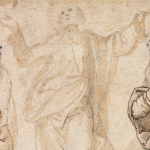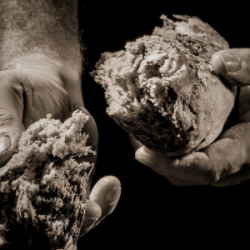
Part 2 of Lessons of Justice from the Transfiguration
Welcome Readers! Please subscribe to Social Jesus Here.
(Read this series from its beginning here.)
Again, by connecting Jesus to these two figures in the transfiguration story, Luke’s gospel is telling us what Jesus was all about. Jesus doesn’t emerge only to hand out tickets to heaven and certificates of pardon for past personal sins. He is standing in the rich Hebrew tradition of working to make our present world a safe, compassionate, just home for the oppressed, marginalized, and subjugated.
The Narrow Path to Distributive Justice
Jesus emerges in a time when his society has once again become complicit in economic injustice toward the poor and the powerful, for their own survival and gain, have become tools of Caesar’s exploitation and power. This exploitation later erupts into the poor people’s revolt of the late 60’s C.E, but first Jesus comes preaching about returning to the way:
“Enter through the narrow gate. For wide is the gate and broad is the road that leads to destruction, and many enter through it. But small is the gate and narrow the path that leads to life, and only a few find it.” (Matthew 7:13-14)
This language resonated with the common people in his audience as they remembered this same language from their ancient prophets and psalms:
This is what the LORD says:
“Stand at the crossroads and look;
ask for the ancient paths,
ask where the good way is, and walk in it,
and you will find rest for your souls. (Jeremiah 6:16)
I walk in the way of righteousness,
along the paths of justice. (Proverbs 8:20)
In his recent book In God We Do Not Trust, Walter Brueggemann elucidates the Torah connection between Jesus’ narrow “way” and the Torah’s “way” of justice:
“In the horizon of Jesus, this path/way consisted of discipleship that required leaving all else to ‘follow.’ This characterization of the alternative community around Jesus as “followers of the way” (Acts 9:2, 24:14) indicates the requirements that we know as “love of God” and “love of neighbor.” This narrow, hard way is an alternative to the broad, easy way of the world marked by self-sufficiency and self-securing. Discipleship to Jesus is indeed an articulation of covenantal obedience to the alternative of Torah. The Torah provides guidance and illumination for how to live this alternative life in the world.” (In God We Do Not Trust, p. 59)
Returning to the social justice elements of the Hebrew tradition became so central to early Jesus followers in the 1st Century that they became known as people of this justice “way.”
Meanwhile, Saul was still breathing out murderous threats against the Lord’s disciples. He went to the high priest and asked him for letters to the synagogues in Damascus, so that if he found any there who belonged to the Way, whether men or women, he might take them as prisoners to Jerusalem. (Acts 9:1-2, emphasis added.)
And what was the concrete outcome of their following this Way? Acts 4 tells us. It wasn’t huge megachurches with record-breaking attendance. It wasn’t political power to enforce their dogma on unbelievers and liberals. The concrete result was “there were no needy persons among them” (Acts 4:34).
This reminds me of the proof Jesus gave to John’s disciples to validate his own ministry: “The good news is proclaimed to the poor” (Luke 7:22).
We are living in a time when this is appplicable in a multitude of ways given our current political landscape. We’ll take a look a some of those applications, in Part 3.
Are you receiving all of RHM’s free resources each week?
Begin each day being inspired toward love, compassion, justice and action. Free.
Sign up at HERE.















